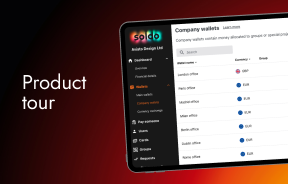Learn about the tools you can implement to make sure you maintain productivity and visibility, even when your team is working remotely.
As the world prepares for the peak of the coronavirus outbreak, many businesses are turning to home working to limit the fallout. In this blog, you’ll find seven insights that will help your team to stay healthy and productive.
1. The right hardware means your world doesn’t stop moving
It almost goes without saying, but for many office-based businesses, laptops are a key ingredient in enabling working from home. But, on their own, laptops don’t result in the same level of productivity as the work environment.
Research suggests a second screen can help to boost productivity between 20-30 percent. So, encourage team members to take a monitor home if they’re going to self-isolate or work from home for any period of time. Oh, and don’t forget a mouse!
2. Businesses can claim for expenses and coronavirus costs
The UK government announced a budget centering around the coronavirus and COVID-19. Businesses with fewer than 250 employees will be able to claim back funds for statutory sick pay, as well as getting access to a temporary business interruption loan scheme. Employees will also be able to claim statutory sick pay from day one of illness.
But you should also be aware of what businesses can claim as expenses and benefits for homeworking. You can find out what’s permissible and what’s exempt with this official government guidance.
3. Virtual debit cards give you more control over spending
When your team need access to cards (for instance, when paying for software, expenses, or online ads), distance can create issues. Tapping a manager on the shoulder to borrow a business credit card is no longer an option, so you open up the risk of sharing card details online or even over texts.
Of course, this represents a serious risk for the security of your business’ finances. But, even if the only people spending are the employees with exiting corporate cards, leaders still need to contend with limited visibility and control.
Soldo is a spend management platform that enables you to give your team their own virtual prepaid business cards. These disposable virtual cards can be created and destroyed as you need them, allowing an agile response during unpredictable conditions.
They come with built-in budgets that help you to manage spending – something that will be critical through the economic downturn expected to result from the coronavirus outbreak. And they give you a live view of spending as it happens, so you have a clear understanding of your business’ financial position.
4. Public transport and offices can be swapped for web conferencing
Don’t make your people hop on trains and buses just to get together as a team. Web conferencing tools keep employees connected, even when they’re miles apart.
There are lots of products available. Google Hangouts, Skype for Business, Zoom and Microsoft Teams are some of the best-known video conferencing tools, and some may even be included in your existing software suites.
These tools are great for meetings, one-to-ones, quick catch ups, and even all-hands events. They integrate with calendar invites, so planning is straightforward. And, as a bonus, there’s no more squabbling over meeting rooms.
5. Enterprise social networks keep the conversation flowing
Besides tools that facilitate one-to-one and group meetings, larger businesses might want to consider social platforms that keep the loop open. Unily, Workplace from Facebook, and the soon-to-be-rejuvenated Yammer all replicate the connectivity of social networks to reproduce the watercooler moments that help businesses do their best work.
Adoption of these tools has been limited, and smaller businesses will be able to achieve the same effects with team collaboration software. But these tools can help to improve communication between employees, keeping your culture intact as you transition to homeworking and back.
6. Team collaboration tools make work a joint enterprise
Equally loved by tech start-ups and agencies, collaboration tools like Slack have become synonymous with agile, remote working. They connect individuals and specific groups, like departments or project teams, around communications tools that integrate with working documents hosted in the cloud.
For service-based and tech-centric businesses, these tools are a great way to keep teams on task, while centralising communication. Which might be why demand for these solutions is soaring in the context of the coronavirus.
7. File-sharing platforms put your team’s outputs in one place
Products like Dropbox, Box and Google Drive are handy for keeping files in one online destination. Increasingly, these platforms weave in communications and productivity tools to better connect teams around their outputs. So, in many cases, there’s an overlap with some of the collaboration tools listed above.
But if you want to ensure continuity, with no risk of files becoming stranded on the computer of a single (potentially ill) employee, these platforms come in handy.
As with Brexit, every business will find its own way through the uncertainty and disruption posed by the coronavirus. But with these tools in place, you can be sure your business is as prepared as it can be. Oh, and you’ll also be ready if the Middle East respiratory syndrome ever arrives on these shores.
Click here to learn how Soldo business prepaid cards can help you to maintain visibility and control over your business’ spending, whether your team is home- or office-based.




























